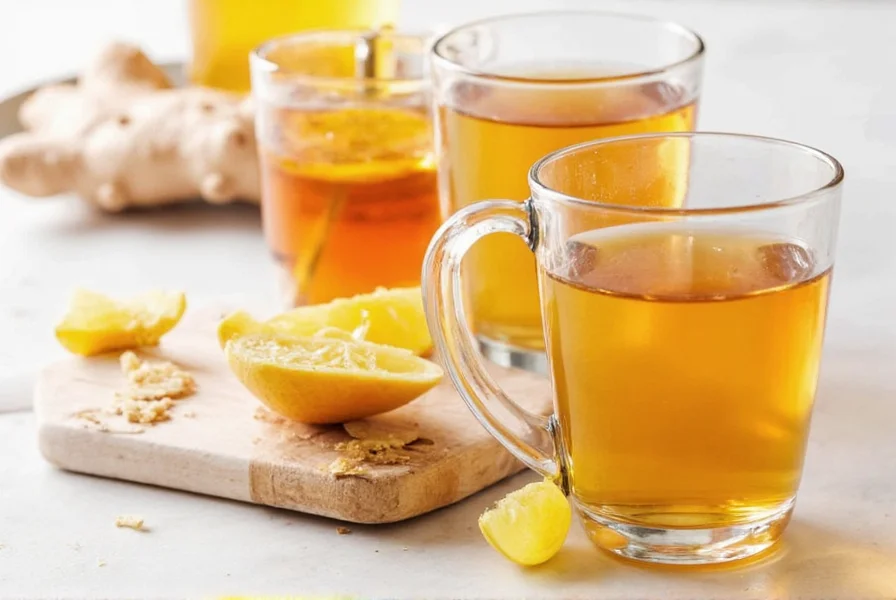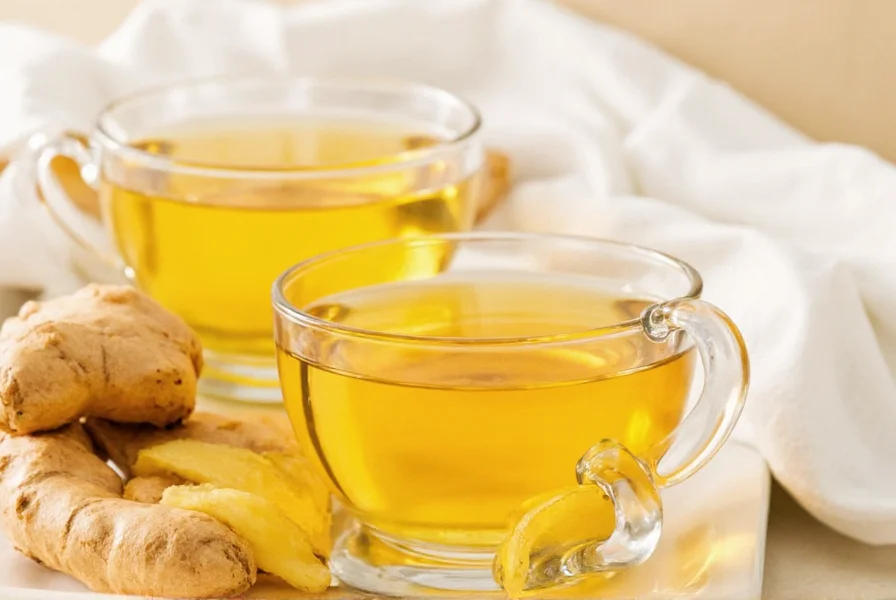For millions suffering from gastroesophageal reflux disease (GERD), finding natural ways to manage uncomfortable symptoms like heartburn and regurgitation becomes a priority. Ginger tea often emerges as a popular home remedy discussion in online health forums and wellness circles. But does this traditional digestive aid actually help with GERD, or could it potentially worsen symptoms? Let's examine what current research reveals about ginger tea for GERD management.
Understanding GERD and Natural Remedies
GERD occurs when stomach acid frequently flows back into the tube connecting your mouth and stomach (esophagus). This backwash (acid reflux) can irritate the lining of your esophagus, causing symptoms like heartburn, regurgitation, and difficulty swallowing. While medications like proton pump inhibitors are commonly prescribed, many people seek complementary approaches to manage their symptoms.
Natural remedies for GERD symptoms have gained popularity as people look for holistic approaches to complement medical treatment. Ginger, a root used for centuries in traditional medicine systems worldwide, has emerged as a potential candidate for digestive support. But understanding whether ginger tea benefits for GERD are supported by science requires examining both traditional uses and contemporary research.
Ginger's Traditional Uses and Modern Research
Ginger (Zingiber officinale) has been used for thousands of years in Ayurvedic and Traditional Chinese Medicine primarily for digestive issues. Historical applications include treating nausea, indigestion, and motion sickness. Modern research has begun to validate some of these traditional uses, particularly regarding ginger's antiemetic (anti-nausea) properties.

Scientific Evidence on Ginger and Digestive Health
Several studies have investigated ginger's effects on the digestive system:
| Study | Findings Related to Digestion | Relevance to GERD |
|---|---|---|
| Marx et al., 2017 (Nutrition Journal) | Ginger accelerated gastric emptying in healthy volunteers | Faster gastric emptying may reduce reflux episodes |
| Raab et al., 2021 (Molecules) | Ginger compounds showed anti-inflammatory effects on gastrointestinal tract | Potential to reduce esophageal inflammation from acid exposure |
| Wigler et al., 2003 (Annals of the NY Academy of Sciences) | Ginger reduced nausea in pregnancy | Nausea often accompanies GERD; ginger may help this symptom |
While these studies suggest potential mechanisms by which ginger might help with digestive issues, direct research on ginger tea for GERD specifically remains limited. Most studies examine ginger in capsule form rather than as a tea, and few focus exclusively on GERD patients.
How Ginger Might Affect GERD Symptoms
Ginger's potential effects on GERD symptoms work through several possible mechanisms:
- Gastric motility enhancement: Some research indicates ginger may speed gastric emptying, potentially reducing the amount of time stomach contents remain in contact with the lower esophageal sphincter.
- Anti-inflammatory properties: Ginger contains compounds like gingerols that may reduce inflammation in the digestive tract, potentially soothing irritation from acid exposure.
- Nausea reduction: For those experiencing nausea alongside GERD, ginger's well-documented anti-nausea effects might provide relief.
However, ginger also has properties that could potentially worsen GERD symptoms for some individuals:
- Ginger may stimulate gastric acid production in certain people
- Its warming nature might trigger heartburn in sensitive individuals
- Some report ginger's spiciness irritates their esophagus
Research Specifically on Ginger Tea and GERD
A 2020 review published in Phytotherapy Research examined herbal remedies for GERD and found limited but promising evidence for ginger's potential benefits. The review noted that while ginger shows anti-inflammatory and prokinetic (motility-enhancing) effects that could theoretically help GERD, more targeted research is needed.
Unlike many other herbal remedies studied for GERD, ginger hasn't been shown to relax the lower esophageal sphincter—a common mechanism that worsens reflux. This potentially makes it safer than alternatives like peppermint tea, which is known to relax this sphincter and potentially exacerbate symptoms.
Preparing Ginger Tea for Potential GERD Benefits
If you decide to try ginger tea for GERD symptom management, preparation method matters. Here's how to maximize potential benefits while minimizing risks:
- Use fresh ginger root rather than powdered ginger for more controlled potency
- Steep 1-2 inches of sliced ginger in hot (not boiling) water for 5-10 minutes
- Start with weaker concentrations and gradually increase if well-tolerated
- Avoid adding citrus or mint, which can trigger reflux in some people
- Drink between meals rather than with meals to avoid increasing stomach volume

Individual Responses and Considerations
Responses to ginger tea for acid reflux vary significantly between individuals. Some GERD sufferers report noticeable improvement in symptoms, while others find it triggers heartburn. This variability likely stems from:
- Differences in GERD severity and underlying causes
- Individual sensitivity to ginger's compounds
- Concurrent medications or health conditions
- Preparation method and concentration
A small 2019 pilot study in the Journal of Gastroenterology and Hepatology found that while 60% of participants with mild GERD reported symptom improvement with ginger supplementation, 25% experienced worsened symptoms. This highlights why personalized approaches are essential when considering natural remedies for GERD symptoms.
Comprehensive GERD Management Approach
Ginger tea should be viewed as a potential complementary approach rather than a standalone treatment for GERD. Effective management typically involves:
- Dietary modifications (avoiding trigger foods like caffeine, alcohol, spicy foods)
- Lifestyle changes (weight management, not lying down after meals)
- Medication as prescribed by your healthcare provider
- Stress management techniques
- Potential natural remedies like ginger tea, used cautiously and monitored
When exploring natural remedies for GERD, it's crucial to track your symptoms systematically. Keep a food and symptom diary to determine whether ginger tea genuinely helps your specific case or if it triggers symptoms.
When to Consult Your Healthcare Provider
Before incorporating ginger tea into your GERD management plan, consult your healthcare provider if:
- You're taking blood thinners (ginger may increase bleeding risk)
- You have diabetes (ginger may affect blood sugar)
- You're scheduled for surgery (stop ginger at least 2 weeks prior)
- You experience severe or worsening symptoms
- You're pregnant or breastfeeding
Additionally, seek immediate medical attention if you experience warning signs like difficulty swallowing, unexplained weight loss, or persistent vomiting, as these could indicate complications requiring prompt treatment.
Conclusion: A Balanced Perspective on Ginger Tea for GERD
The question of whether ginger tea helps with acid reflux doesn't have a universal answer. Current evidence suggests it may provide mild benefits for some individuals with GERD through its anti-inflammatory properties and potential to improve gastric motility. However, ginger can also trigger symptoms in certain people, making individual experimentation necessary.
For those interested in trying ginger tea for digestive health, start with small amounts of weak tea between meals and monitor your symptoms carefully. Remember that ginger tea should complement—not replace—conventional GERD treatments and lifestyle modifications. As research continues to evolve, we may gain clearer insights into ginger's specific role in GERD management.
Frequently Asked Questions
Does ginger tea help with acid reflux immediately?
Ginger tea doesn't typically provide immediate relief for acute acid reflux episodes. While some people report feeling better within 30-60 minutes of drinking ginger tea, its potential benefits for GERD are more likely to manifest with regular, consistent use over time rather than providing instant relief. For immediate heartburn relief, antacids are generally more effective.
Can ginger tea worsen GERD symptoms?
Yes, ginger tea can worsen GERD symptoms for some individuals. While ginger may help digestion for many people, its spicy nature and potential to stimulate gastric acid production can trigger heartburn in sensitive individuals. Approximately 25% of GERD patients in studies have reported worsened symptoms after consuming ginger. If you notice increased heartburn after drinking ginger tea, discontinue use.
How much ginger tea is safe to drink with GERD?
For GERD management, start with 1/4 to 1/2 cup of weak ginger tea once daily between meals. If well-tolerated after a week, you can gradually increase to 1 cup daily. Never exceed 4 grams of ginger per day from all sources. Stronger concentrations or larger amounts increase the risk of triggering symptoms. Always listen to your body and reduce or stop consumption if you experience any worsening of symptoms.
Is fresh ginger better than ginger tea for GERD?
Fresh ginger may be preferable to commercial ginger tea for GERD management because you can control the concentration. Fresh ginger allows you to make weaker tea by using less ginger or shorter steeping time. Many commercial ginger teas contain additional ingredients like citrus or mint that can trigger reflux. When using fresh ginger, slice rather than grate it for a milder infusion that's potentially less irritating for sensitive digestive systems.
What's the best time to drink ginger tea for GERD?
The optimal time to drink ginger tea for GERD management is between meals, ideally 1-2 hours after eating. Drinking ginger tea with meals may increase stomach volume and pressure, potentially triggering reflux. Morning or mid-afternoon between meals are generally the safest times. Avoid drinking ginger tea within 3 hours of bedtime, as lying down with any liquid in your stomach can increase nighttime reflux episodes.











 浙公网安备
33010002000092号
浙公网安备
33010002000092号 浙B2-20120091-4
浙B2-20120091-4